- Home
- Philip Roth
Letting Go
Letting Go Read online
Philip Roth
Letting Go
In 1997 Philip Roth won the Pulitzer Prize for American Pastoral. In 1998 he received the National Medal of Arts at the White House, and in 2002 received the highest award of the American Academy of Arts and Letters, the Gold Medal in Fiction, previously awarded to John Dos Passos, William Faulkner, and Saul Bellow, among others. He has twice won the National Book Award, the PEN/Faulkner Award, and the National Book Critics Circle Award. In 2005, The Plot Against America received the Society of American Historians Award for “the outstanding historical novel on an American theme for 2003–2004.”
BOOKS BY Philip Roth
ZUCKERMAN BOOKS
The Ghost Writer
Zuckerman Unbound
The Anatomy Lesson
The Prague Orgy
The Counterlife
American Pastoral
I Married a Communist
The Human Stain
ROTH BOOKS
The Facts • Deception
Patrimony • Operation Shylock
The Plot Against America
KEPESH BOOKS
The Breast
The Professor of Desire
The Dying Animal
MISCELLANY
Reading Myself and Others
Shop Talk
OTHER BOOKS
Goodbye, Columbus • Letting Go
When She Was Good • Portnoy’s Complaint • Our Gang
The Great American Novel • My Life as a Man
Sabbath’s Theater • Everyman
FIRST VINTAGE INTERNATIONAL EDITION, SEPTEMBER 1997
Copyright © 1961, 1962 by Philip Roth
Copyright renewed 1989, 1990 by Philip Roth
All rights reserved under International and
Pan-American Copyright Conventions.
Published in the United States by Vintage Books,
a division of Random House, Inc., New York,
and simultaneously in Canada by
Random House of Canada Limited, Toronto.
Originally published in hardcover in the United States by
Random House, Inc., New York, in 1962.
Lines from “Earth Angel,” on this page, quoted by
permission of Dootsie Williams, Inc., Los Angeles, California.
Portions of this book have appeared in slightly
different form in Esquire, Harper’s, and Mademoiselle.
Library of Congress Cataloging-in-Publication Data
Roth, Philip.
Letting go / Philip Roth.
p. cm.
eISBN: 978-0-307-78862-7
I. Title.
PS3568.O855L4 1997
813′.54—dc21 97-6675
Random House Web address: http://www.randomhouse.com/
v3.1
For Maggie
The author wishes to acknowledge the generous help given to him during the writing of this book by the John Simon Guggenheim Memorial Foundation and the National Institute of Arts and Letters.
Contents
Cover
About the Author
Other Books by This Author
Title Page
Copyright
Dedication
Acknowledgment
Epigraph
One Debts and Sorrows
Two Paul Loves Libby
Three The Power of Thanksgiving
Four Three Women
Five Children and Men
Six The Mad Crusader
Seven Letting Go
All actuality is deadly earnest; and it is morality itself that, one with life, forbids us to be true to the guileless unrealism of our youth.
—Thomas Mann
A Sketch of My Life
Men owe us what we imagine they will give us. We must forgive them this debt.
—Simone Weil
Gravity and Grace
It may be that one life is a punishment
For another, as the son’s life for the father’s.
But that concerns the secondary characters.
It is a fragmentary tragedy
Within the universal whole. The son
And the father alike and equally are spent,
Each one, by the necessity of being
Himself, the unalterable necessity
Of being this unalterable animal.
—Wallace Stevens
“Esthétique du Mal”
One
Debts and Sorrows
1
Dear Gabe,
The drugs help me bend my fingers around a pen. Sometimes the whole sickness feels located in my hands. I have wanted to write but not by dictating to your father. Later I don’t want to whisper last-minute messages to him at the bedside. With all the panic and breathlessness I’ll have too much influence. Now your father keeps leaning across my bed. He runs in after every patient and tells me what the weather is outside. He never once admits that I’ve done him an injustice being his wife. He holds my hand fifty times a day. None of this changes what has happened—the injustice is done. Whatever unhappiness has been in our family springs from me. Please don’t blame it on your father however I may have encouraged you over the years. Since I was a little girl I always wanted to be Very Decent to People. Other little girls wanted to be nurses and pianists. They were less dissembling. I was clever, I picked a virtue early and hung on to it. I was always doing things for another’s good. The rest of my life I could push and pull at people with a clear conscience. All I want to say now is that I don’t want to say anything. I want to give up the prerogative allowed normal dying people. Why I’m writing is to say that I have no instructions.
Your father is coming in again. He’s carrying three kinds of fruit juices. Gabe, it’s to him I should admit all this. He won’t condemn me until I do first. All through our marriage I’ve been improving his life for him, pushing, pulling. Oh decent decent. Dear, the pen keeps failing
Her letter had never been signed. The pen fell, and when the night nurse came on duty she was no longer needed. Nevertheless my father, obedient to the last, put the letter in an envelope and without examination mailed it. I was a second lieutenant in the artillery corps at this time, stationed in an unregenerate dust bowl in Oklahoma, and my one connection with the world of feeling was not the world itself but Henry James, whom I had lately begun to read. Oklahoma nights and southwestern radio stations had thrust me into an isolation wherein my concentration was exact enough for me to attend at last to the involutions of the old master. All day I listened to the booming of cannons, and all night to the words of heroes and heroines tempting one another into a complex and often tragic fate. Early in the summer that I had been called into the Army—which was the summer after I had finished college—I had spent my last six civilian weeks touring Europe; one week was spent visiting with a friend of my mother’s who lived in London, where her husband was connected with the U. S. Embassy. I remember having to hear endless incidents from my mother’s childhood while sitting with her friend in a small church in Chelsea; she had taken me there to see a little-known plaque dedicated to James. It was not a particularly successful day, for the woman really liked the idea of putting on long white gloves and showing a Harvard boy around cultural nooks and crannies a good deal more than she liked the nooks and crannies. But I do remember the words engraved onto that small gray oval tablet: it was written of James that he was “lover and interpreter of the fine amenities of brave decisions.”
So it happened that when I received the letter my mother had written and my father had posted, I was reading Portrait of a Lady, and it was into its pages that I slid the envelopes and its single sheet of barely legible prose. When I returned from the funeral, and in the weeks following, I read and reread the letter so often th
at I weakened the binding of the book. In my grief and confusion, I promised myself that I would do no violence to human life, not to another’s, and not to my own.
It was a year later that I loaned the book to Paul Herz, who looked to be a harried young man rapidly losing contact with his own feelings; he might have been hearing the boom of big guns going off all day himself. This was the fall after I had left the Army, the fall of 1953, when we were both enrolled as graduate students at the University of Iowa. Paul’s costume at that time was the same day in and day out: khaki trousers threadbare around the back pocket, a white T-shirt shapeless around the arms, tennis sneakers and, occasionally, socks. He was forever running—it was this that brought him to my attention—and forever barely making it. The point of his briefcase could be seen edging through the classroom door just at the moment that the first unlucky student in our Anglo-Saxon class was called upon to read aloud from Beowulf. Leaving the library at night, I would see him streaking up the stairs after some reserve book, even while the head librarian turned the key in the lock. He would stand shivering in his T-shirt until she broke down and let him in. He was a man who evoked sympathy even if he did not come right out and ask for it; even if he would not ask for it. No heart could remain unmoved by the sight of that dark, kinky-haired black-eyed head racing toward the closing doors, or into them. Once, shopping for some bread and milk, I saw him nearly break several of the major bones of his body at the entrance to a downtown grocery store. The electric eye swung the door out at him just as he had turned, arms laden with packages, to watch a cop stick a ticket under the single wiper of his battered, green, double-parked Dodge.
I lived alone at the time in a small apartment near the campus, and was having troubles of my own; I was about ready to find somebody to complain to. One day in November, as Herz was darting from Anglo-Saxon, I stuck myself in his path and asked him over to the Union for a cup of coffee. He couldn’t make it as he was supposed to have been somewhere else five minutes earlier, but on the parking lot, to which I accompanied him, and where he sat yanking and yanking at the throttle of his car, I managed to put in something about James, and the next time we had class together, I brought Portrait for him to take home and read, I awoke that night remembering that tucked in the pages of the book I had pressed upon him, somewhere between the hopes of Isabel Archer and her disappointments, was my mother’s letter. I couldn’t immediately get back to sleep.
The following morning, directly after Medieval Romances, I called Herz from a campus phone booth. Mrs. Herz answered sounding hurried and on edge—the family tone. She and her husband lived in one of those gray shells on the far side of the river, the married students’ barracks, and I was sure that directly behind her, or beneath her, there flailed a squalling infant. Herz looked harassed enough to be the father of three or four small, mean, colicky children. Mrs. Herz, in a very few words, informed me that her husband had driven over to Cedar Rapids and that she was herself about to rush off. I decided instantly not to ask if I might come over to remove something that I had left in a book I had loaned Paul. Probably neither of them had had a chance at the book anyway, and I could wait and later get to Herz himself. I explained nothing whatsoever to the wife, who struck me as more rude than chagrined; besides, it was daylight and autumn and I was no longer afflicted with thoughts of the dead. The November morning was dazzling, the dead were dead.
My father had called again the night before, and I was certain now that any judgments I had made in the dark about my mother’s ghost had been induced by my father’s presence. Two or three evenings a week my father and I had the same phone conversation, pointless on the surface, pleading beneath. The old man stood being familyless all day, what with having his patients’ mouths to look into; it was alone with his avocado and lettuce dinner that he broke down. When he called his voice shook; when he hung up—or when I did—his vibrato passed directly into the few meager objects in the room. I moved one way, my chair another; I have never sat on my reading glasses so many times in my life. I am, for good or bad, in a few ways like my father, and so have never been the same person alone that I am with people. The trouble with the phone calls, in fact, was that all the time I felt it necessary to the preservation of my life and sanity to resist the old man, I understood how it was for him sitting in that huge Victorian living room all alone. However, if I am my father’s child, I am my mother’s too. I cannot trace out exactly the influences, nor deal in any scientific way with the chromosomes passed on to me. I sometimes believe I know what it is I got from him and what from her, and when I hung up on Mrs. Herz that morning, without having said one word about the letter, I suppose I was using the decorum and good sense that has sifted down from the maternal line. I told myself that there was nothing really to fret about. Why would they read it anyway? And what if they did?
At five o’clock I was sitting in my apartment drinking coffee and finding no pleasure whatsoever in memorizing Anglo-Saxon verb endings, when Mrs. Herz called me back.
“You spoke to me this morning,” she said. “Paul Herz’s wife.”
“Is your husband home?”
“His car broke down.”
It was the sort of news that is not news as soon as one hears it—though Mrs. Herz herself sounded surprised. “That’s too bad,” I said.
“He blew a piston or he keeps blowing pistons—”
“I’ll call him some other time. It’s not urgent.”
“Well—” she said, “he asked me to call you. He wondered if you might have a car. He’s on the highway outside of Cedar Rapids.”
I put down the Old English grammar book. A long drive was just the inconvenience I wanted. “How do I get there?”
“Could you pick me up at the barracks?”
“I’m sure I could find it.”
“I know the way. We live just at the edge of Finkbine Park—could you pick me up?” Cryptically, she added, “I’m dressed.”
From the doorway the first thing I saw after seeing Libby Herz herself was my book set on the edge of the kitchen sink; I could not see what was or was not stuck between its pages. And Mrs. Herz gave me no time to check; she ran into the bedroom and then out again, her raincoat whipping around her. Then yanking a kerchief from her pocket, she rushed out the door without once looking directly at me—though she managed to let me hear her say, “Paul called again. I told him we were coming.”
As we drove, her eyes stared rigidly out the car window, while beside me her limbs fidgeted in turn. My first impression of her had been clear and sharp: profession—student; inclinations—neurotic. She moved jerkily and had the high black stockings and the underfed look. She was thin, dark, intense, and I could not imagine that she had ever once gotten anything but pain from entering a room full of people. Still, in an eager hawky way she was not bad looking. Her head was carried forward on her neck, and the result was that her large sculpted nose sailed into the wind a little too defiantly—which compromised the pride of the appendage, though not its fanciness. Her eyes were a pure black, and her shiny hair, also black, was drawn off her face in a manner so stark and exact that at the sight of it one could begin guessing at the depth and number of her anxieties. The skin was classic and pale: white with a touch of blue, making it ivory—and when she pulled off her kerchief she even had a tiny purple vein tapping at her temple; it seemed to me like an affect, something willed there to remind the rest of us how delicate and fragile is a woman. My initial feeling toward her was suspicion.
Nevertheless, by way of conversation I asked if she had any children.
“Oh, no,” she said. The deep breath she drew was to inform me that she was rushed and harried without children. She added a few mumbled words: “Thank goodness … children … burden …” It was difficult to understand her because she did not bother to look at me either when speaking or sighing. I knew she was avoiding my eyes—and then I knew that she had opened the book, removed the envelope, and read my mother’s letter. Since she did not stri
ke me as a person casual about private lives, her own or others, her self-consciousness became mine too.
Darkness had dimmed my vision before either of us spoke again. “Are you in the Writers’ Workshop?” she asked.
“No. Just English. Are you?”
“Paul’s the writer,” she said. “I’m still getting my B.A.”
“I see.”
“I’ve been getting it for about a decade.” There was a frank and simple note of exasperation in her voice, and it engaged me. I looked away from the highway and she gave off staring into the countryside, and with a glance as distinct, as audible as a camera snapping, we registered each other’s features.
“Paul said you’re interested in James,” she quickly said, flushing. Then, “I’m Libby.”
“I’m Gabe Wallach—” I stopped as once again the words flew out of her.
“Neither of us know anything really outside the Edmund Wilson one—” she said, “the ghost story.”
“Turn of the Screw,” I said, a good half minute after she had not resumed talking.
“Portrait of a Lady is much better.” She spoke these words as though to please.
“You like it?”
“The first scene is wonderful.”
“When they’re all on the lawn.”
“Yes,” she said, “when Isabel comes. I’ve been living so long in barracks, elegance has an abnormal effect on me.”
“The prose?”
“The rug on the lawn. You know, they’re all sitting on chairs on that immense lawn outside the Touchett’s house. Ralph and his father and Lord Warburton. James says the place was furnished as though it were a room. There’s a rug on the lawn. I don’t know, perhaps it’s just across somebody’s legs, one of those kind of rugs. I’ve read it over several times, and since you can’t be sure, I like to think of it the other way, on the lawn. That appeals to me.” She stopped, violently—and I was left listening for the next few words. I looked over and saw that she was drawing on her top lip so that her nose bent a little at the bottom. All that was dark, her eyes and hair, came to dominate her face. “That sounds terribly private,” she said. “Sometimes I miss the point, I know.” The little forced laugh that followed admitted to fallibilities not solely literary. I was touched by her frailty, until I wondered if perhaps I was supposed to be. “The rug,” she was saying, “knocked me over anyway.” Whereupon her gaze dropped to the floorboard of the car.

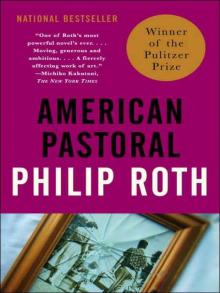 American Pastoral
American Pastoral The plot against America
The plot against America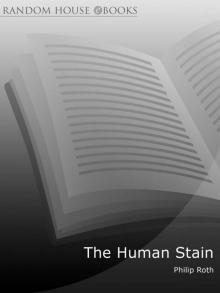 The Human Stain
The Human Stain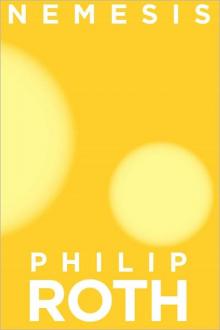 Nemesis n-4
Nemesis n-4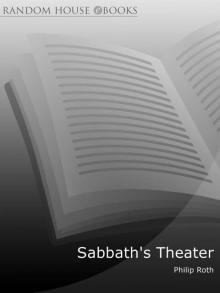 Sabbath’s Theater
Sabbath’s Theater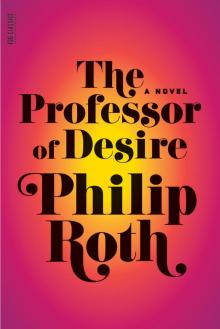 The Professor of Desire
The Professor of Desire Our Gang
Our Gang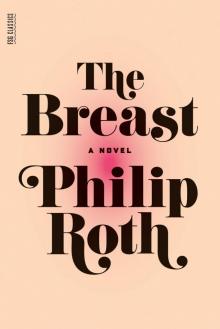 The Breast
The Breast Operation Shylock
Operation Shylock The Dying Animal
The Dying Animal Letting Go
Letting Go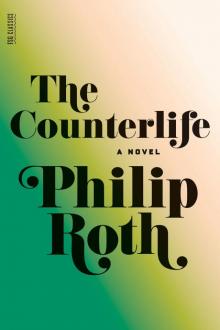 The Counterlife
The Counterlife Everyman
Everyman Nemesis
Nemesis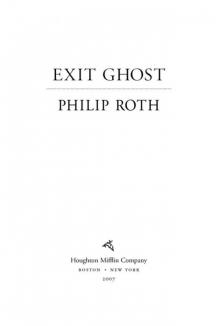 Exit Ghost
Exit Ghost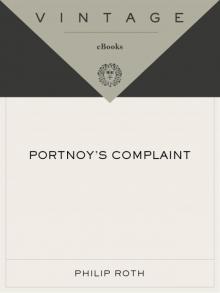 Portnoy's Complaint
Portnoy's Complaint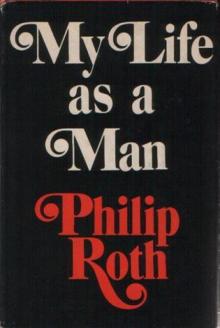 My Life as a Man
My Life as a Man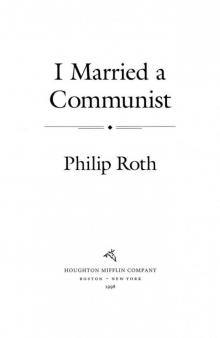 I Married a Communist
I Married a Communist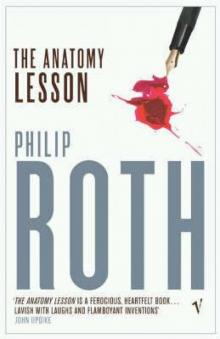 The Anatomy Lesson
The Anatomy Lesson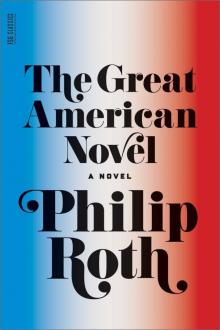 The Great American Novel
The Great American Novel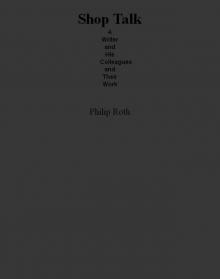 Shop Talk
Shop Talk The Humbling
The Humbling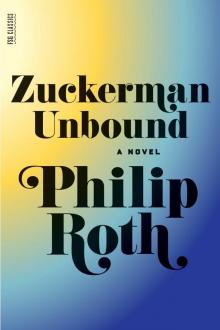 Zuckerman Unbound
Zuckerman Unbound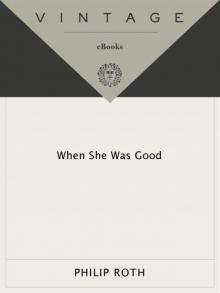 When She Was Good
When She Was Good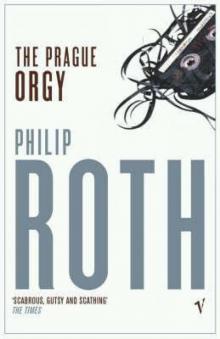 The Prague Orgy
The Prague Orgy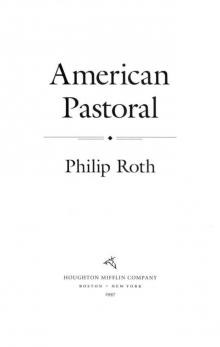 American Pastoral (Nathan Zuckerman)
American Pastoral (Nathan Zuckerman) Goodbye, Columbus
Goodbye, Columbus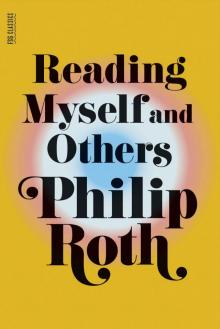 Reading Myself and Others
Reading Myself and Others